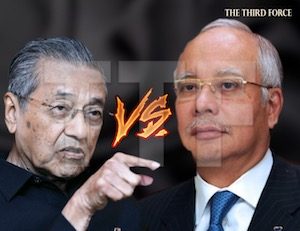
Note: TTF does not necessarily agree with the conclusions derived by the author herein, though the review is objective and does help add to the pool of information from which Malaysians could derive their own conclusions.
Wanxiang
As we leave the first quarter of the year and close into Malaysia’s 14th General Election (GE14), it begs us to wonder that if our economy has been going well. Earlier this year, there are contradicting reports about Malaysia’s good economic outlook is allegedly based on falsified data and the economic data doesn’t reflect the economic landscape rakyat is living in. The back and forth is making Malaysians distraught.
To add to the on-going discussion, both Najib and Mahathir have different arguments when it comes to national debt. Here are 4 things you need to know about national debt and how the GE14 will affect our economy in the future.
1. MALAYSIA’S NATIONAL DEBT IN 2017
Last November report from the Ministry of Finance revealed that the federal debt stood at RM685.1 billion as of June 2017. It was a steep increase of 20% as compared to March 2016. The number is sure big but is it alarming? Will our country go bankrupt?
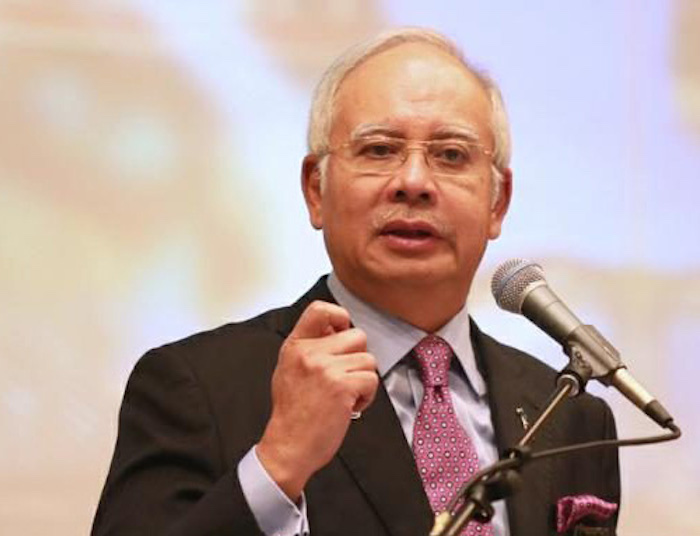
Source: Ideas
According to our finance minister, who is also the prime minister, Datuk Seri Najib Tun Razak, said the claim of Malaysia is going bankrupt is baseless.
“The highest debt level was recorded in 1986 when the national debt ratio then was 103.4% of the country’s GDP (Gross Domestic Product). Today, our debt to GDP ratio is just 50.8%.
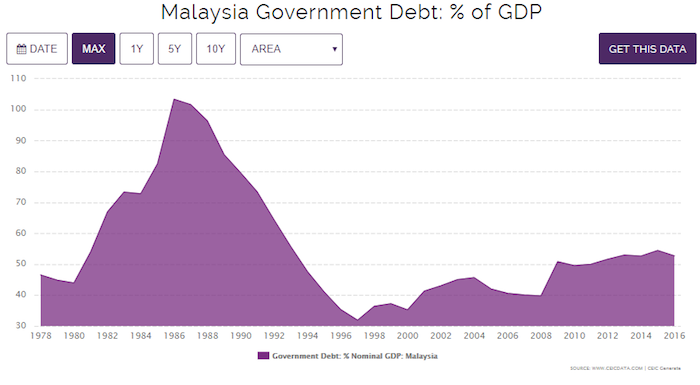
Source: ceicdata
“This means that as a government we have been prudent and responsible,” said Najib last Friday during a dialogue in conjunction with the National Transformation Programme (NTP) Annual Report 2017 Review.
The PM added that countries like Japan is in debt by 240% of GDP, Singapore 111%, and the United Kingdom 89% − if any country would go bankrupt, it would be them, not Malaysia.
MUST READ Filipino Maid Caught Employer On Camera After He Forced Her To Have Sex Countless Of Times
2. NATIONAL DEBT: NAJIB VS MAHATHIR TIME AS PRIME MINISTER
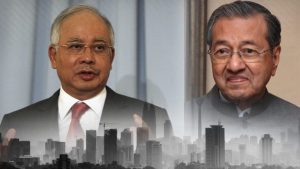
Source: KedahNews
March 12, Barisan Nasional Strategic Communications (BNSC) deputy director Datuk Eric See-To released a table of the Government’s debt-to-service ratio history obtained from the Economic Planning Unit, which showed a 12% ratio for 2016.
To put things into perspective, Malaysia’s debt-to-service ratio was at its highest during former prime minister Tun Dr Mahathir Mohamad’s tenure from 1981 to 2003.
It stood at 12.9% in 1981 during Mahathir’s first term as PM, increased to 23.9% in 1985, and worst, 31.8% in 1987 before gradually decreasing.
See-To said the record showed that almost a third (33%) of Malaysia’s yearly revenue in the 1980s was used to repay debt compared to 12% currently.
“Historically, we are not at high levels compared to the Mahathir years – especially the first six years after he came into power where he more than doubled our debt-to-gross domestic product (GDP) ratio in just a few years.
“If we did not go bankrupt then when our debt-to-service ratio was 32% and the debt-to-GDP ratio was above 100%, how are we supposed to be going bankrupt now when our debt-to-service ratio is 12% and our debt-to-GDP ratio is 50.9%?” said the BNSC deputy director.
3. NATIONAL DEBT WILL INCREASE TO RM1.1 TRILLION IF THE OPPOSITION COMES INTO POWER AFTER GE-14
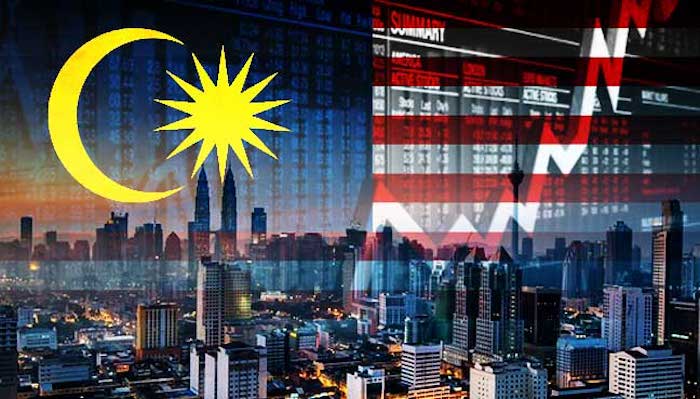
Source: FMT
A drastic additional of RM416 billion or 60% of debt will befall onto Malaysians if the opposition wins the election, said Najibto the students at the Universiti Malaysia Perlis (UniMAP) on March 13.
He reasoned that the deep plummet of debt would come from the abolishment of the goods and services tax (GST) and existing toll collection, two of which are promised by Pakatan Harapan in their manifesto.
MUST READ SCMP : Why Are The Chinese Still Being Denied Land In Indonesia? – Second Class Citizen ?
To that, Mahathir said that the claim is false, “there is no basis to Najib’s claim. The national debt went up during Najib’s tenure as prime minister. Our work is to reduce the debt.
“What is the basis for his claim? When I was in government, was the national debt this high?” asked the opposition prime ministerial candidate.
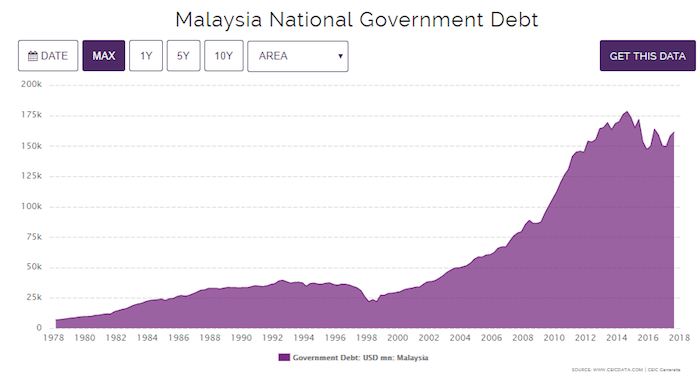
Source: ceicdata Note that the total national debt has increased exponentially as the graph shown below but the debt-to-service/GDP ratio was indeed higher during Mahathir’s time as PM.
The PH chairman added the opposition had never set up a company to be in massive debt.
“But Najib set up 1MDB and made sure that it was not included in the regulations so that it could pile on debts.
“Have you heard of anyone that could pile on debts like Najib?
“He knows how to accumulate debt but doesn’t know how to reduce them.
“Even when a train system has no passengers, he still went ahead to build it and accumulate more debts than the cost needed to build the rail system,” he said, referring to the MRT rail system.
Looks like the two are using two different data to make their points − national debt (Mahathir) vs debt-to-GDP/service (Najib). So who is right?
4. NEITHER. EXPERTS SAY REGARDLESS WHO WINS THE GE-14, MALAYSIA’S ECONOMY WILL STILL REMAIN THE SAME − FOR BETTER OR FOR WORSE.

Source: malaysiandigest
One of the world’s leading foreign exchange brokers, Alpari Research & Analysis Ltd, said that Malaysia’s economy has a very promising outlook as the coming general elections will not have an impact on its economic fundamentals.
“Malaysia is one of the best environments for foreign investors,” said its Chief Executive Officer, Roberto d’Ambrosio, adding that Malaysians shouldn’t be concerned about the level of national debt as it was still below the self-imposed ceiling of 55% against the GDP.
d’Ambrosio cited that the ringgit, which was also expected to weaken against the US dollar at 3.90 towards year-end due to the anticipated US interest rates hike, would also boost Malaysia’s competitiveness as an exporting country.
On the other side of the argument, Tokyo-based journalist William Pesek said the two political leaders are indifferent in certain terms. Pesek argued that Mahathir did transform Malaysia from a “tropical backwater” to a “tiger economy” but at a cost of establishing Malay-first society that gives way to race-based quotas in public jobs, business contracts and education. When Najib took over in 2009, Pesek added, he “doubled down on economic apartheid”.
“While both men will almost certainly put on a dramatic no-holds-barred political show, neither the contest, nor the result, is likely to reverse the once-promising economy’s steady slip-slide off the world’s centre stage.
“Malaysia must reduce the stifling role of government, shift toward high-value-added production, increase innovation and halt a brain drain caused by Chinese and Indian talent fleeing to Singapore and Hong Kong. And yet this election is more about two political titans brawling over who is less shady than finding a new way forward.”
Source: The Coverage



